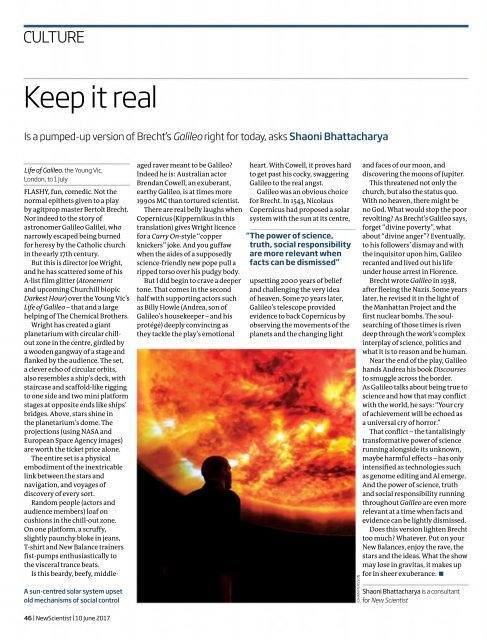New Scientist – June 10 2017
Create successful ePaper yourself
Turn your PDF publications into a flip-book with our unique Google optimized e-Paper software.
CULTURE<br />
Keep it real<br />
Is a pumped-up version of Brecht’s Galileo right for today, asks Shaoni Bhattacharya<br />
LifeofGalileo, the Young Vic,<br />
London, to 1 July<br />
A sun-centred solar system upset<br />
old mechanisms of social control<br />
FLASHY, fun, comedic. Not the<br />
normal epithets given to a play<br />
by agitprop master Bertolt Brecht.<br />
Nor indeed to the story of<br />
astronomer Galileo Galilei, who<br />
narrowly escaped being burned<br />
for heresy by the Catholic church<br />
in the early 17th century.<br />
But this is director Joe Wright,<br />
and he has scattered some of his<br />
A-list film glitter (Atonement<br />
and upcoming Churchill biopic<br />
Darkest Hour) over the Young Vic’s<br />
Life of Galileo <strong>–</strong> that and a large<br />
helping of The Chemical Brothers.<br />
Wright has created a giant<br />
planetarium with circular chillout<br />
zone in the centre, girdled by<br />
a wooden gangway of a stage and<br />
flanked by the audience. The set,<br />
a clever echo of circular orbits,<br />
also resembles a ship’s deck, with<br />
staircase and scaffold-like rigging<br />
to one side and two mini platform<br />
stages at opposite ends like ships’<br />
bridges. Above, stars shine in<br />
the planetarium’s dome. The<br />
projections (using NASA and<br />
European Space Agency images)<br />
are worth the ticket price alone.<br />
The entire set is a physical<br />
embodiment of the inextricable<br />
link between the stars and<br />
navigation, and voyages of<br />
discovery of every sort.<br />
Random people (actors and<br />
audience members) loaf on<br />
cushions in the chill-out zone.<br />
On one platform, a scruffy,<br />
slightly paunchy bloke in jeans,<br />
T-shirt and <strong>New</strong> Balance trainers<br />
fist-pumps enthusiastically to<br />
the visceral trance beats.<br />
Is this beardy, beefy, middleaged<br />
raver meant to be Galileo?<br />
Indeed he is: Australian actor<br />
Brendan Cowell, an exuberant,<br />
earthy Galileo, is at times more<br />
1990s MC than tortured scientist.<br />
There are real belly laughs when<br />
Copernicus (Kippernikus in this<br />
translation) gives Wright licence<br />
for a Carry On-style “copper<br />
knickers” joke. And you guffaw<br />
when the aides of a supposedly<br />
science-friendly new pope pull a<br />
ripped torso over his pudgy body.<br />
But I did begin to crave a deeper<br />
tone. That comes in the second<br />
half with supporting actors such<br />
as Billy Howle (Andrea, son of<br />
Galileo’s housekeeper <strong>–</strong> and his<br />
protégé) deeply convincing as<br />
they tackle the play’s emotional<br />
heart. With Cowell, it proves hard<br />
to get past his cocky, swaggering<br />
Galileo to the real angst.<br />
Galileo was an obvious choice<br />
for Brecht. In 1543, Nicolaus<br />
Copernicus had proposed a solar<br />
system with the sun at its centre,<br />
“The power of science,<br />
truth, social responsibility<br />
are more relevant when<br />
facts can be dismissed”<br />
upsetting 2000 years of belief<br />
and challenging the very idea<br />
of heaven. Some 70 years later,<br />
Galileo’s telescope provided<br />
evidence to back Copernicus by<br />
observing the movements of the<br />
planets and the changing light<br />
JOHAN PERSSON<br />
and faces of our moon, and<br />
discovering the moons of Jupiter.<br />
This threatened not only the<br />
church, but also the status quo.<br />
With no heaven, there might be<br />
no God. What would stop the poor<br />
revolting? As Brecht’s Galileo says,<br />
forget “divine poverty”, what<br />
about “divine anger”? Eventually,<br />
to his followers’ dismay and with<br />
the inquisitor upon him, Galileo<br />
recanted and lived out his life<br />
under house arrest in Florence.<br />
Brecht wrote Galileo in 1938,<br />
after fleeing the Nazis. Some years<br />
later, he revised it in the light of<br />
the Manhattan Project and the<br />
first nuclear bombs. The soulsearching<br />
of those times is riven<br />
deep through the work’s complex<br />
interplay of science, politics and<br />
what it is to reason and be human.<br />
Near the end of the play, Galileo<br />
hands Andrea his book Discourses<br />
to smuggle across the border.<br />
As Galileo talks about being true to<br />
science and how that may conflict<br />
with the world, he says: “Your cry<br />
of achievement will be echoed as<br />
a universal cry of horror.”<br />
That conflict <strong>–</strong> the tantalisingly<br />
transformative power of science<br />
running alongside its unknown,<br />
maybe harmful effects <strong>–</strong> has only<br />
intensified as technologies such<br />
as genome editing and AI emerge.<br />
And the power of science, truth<br />
and social responsibility running<br />
throughout Galileo are even more<br />
relevant at a time when facts and<br />
evidence can be lightly dismissed.<br />
Does this version lighten Brecht<br />
too much? Whatever. Put on your<br />
<strong>New</strong> Balances, enjoy the rave, the<br />
stars and the ideas. What the show<br />
may lose in gravitas, it makes up<br />
for in sheer exuberance. ■<br />
Shaoni Bhattacharya is a consultant<br />
for <strong>New</strong> <strong>Scientist</strong><br />
46 | <strong>New</strong><strong>Scientist</strong> | <strong>10</strong> <strong>June</strong> <strong>2017</strong>


















